BLOG
Find support not just for emotional eating, but all aspects of your well-being.
Supporting Your Mental Health at Work
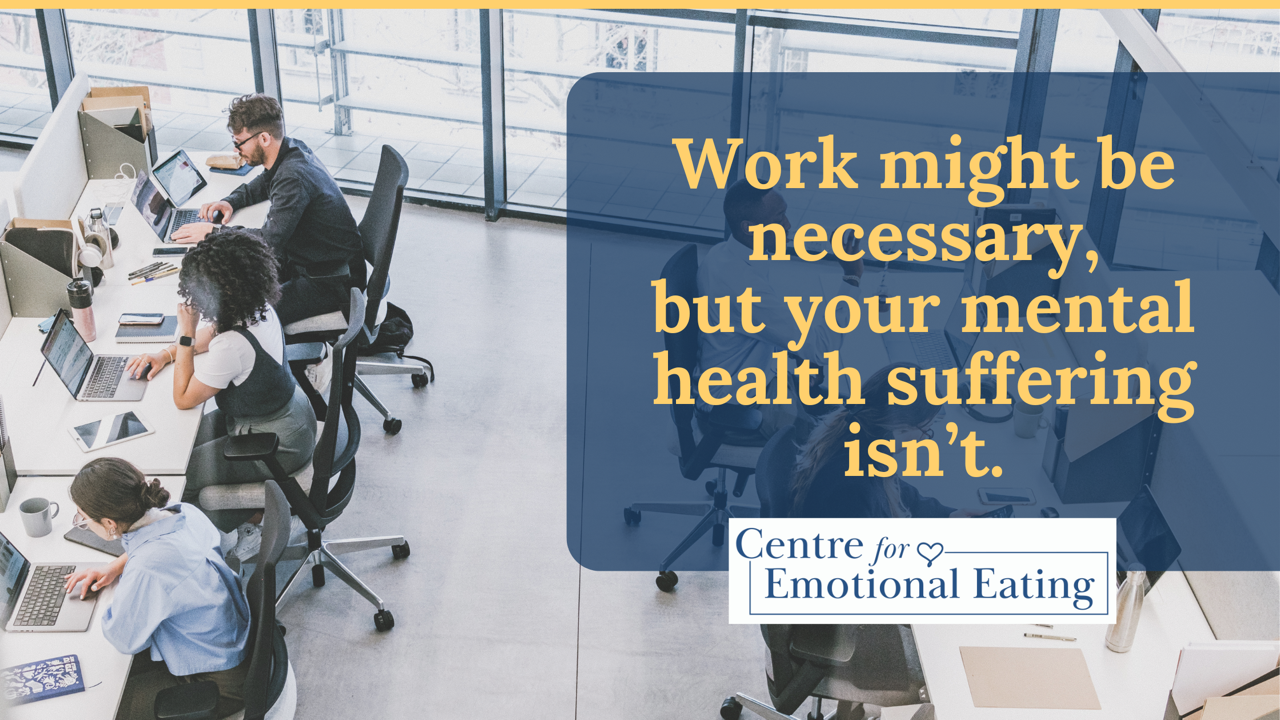
No matter what you do for work, chances are it is a stressor in your life. Even if you enjoy your job, there might be tasks or colleagues you’d rather not deal with. Work is a necessity not just for income, but also purpose, goal setting, community, and future planning.
That doesn’t mean it isn’t stressful.
Below are a number of ways you can support your mental health as a worker.
Basic Maintenance Goes a Long Way
You might already know that routines, rituals, and structure can support your well-being, so focusing on identifying working hours (and rest or play hours), practicing good sleep hygiene, and implementing boundaries around your work phone or logging in can be incredibly helpful for supporting your mental health. It can also be helpful to create a transition ritual where you let your nervous system know that you are changing from work you to home you. Listen to a meditation app on your commute or change clothes as soon as you are home. These can signal to your body that it...
Befriending Your Inner Critic
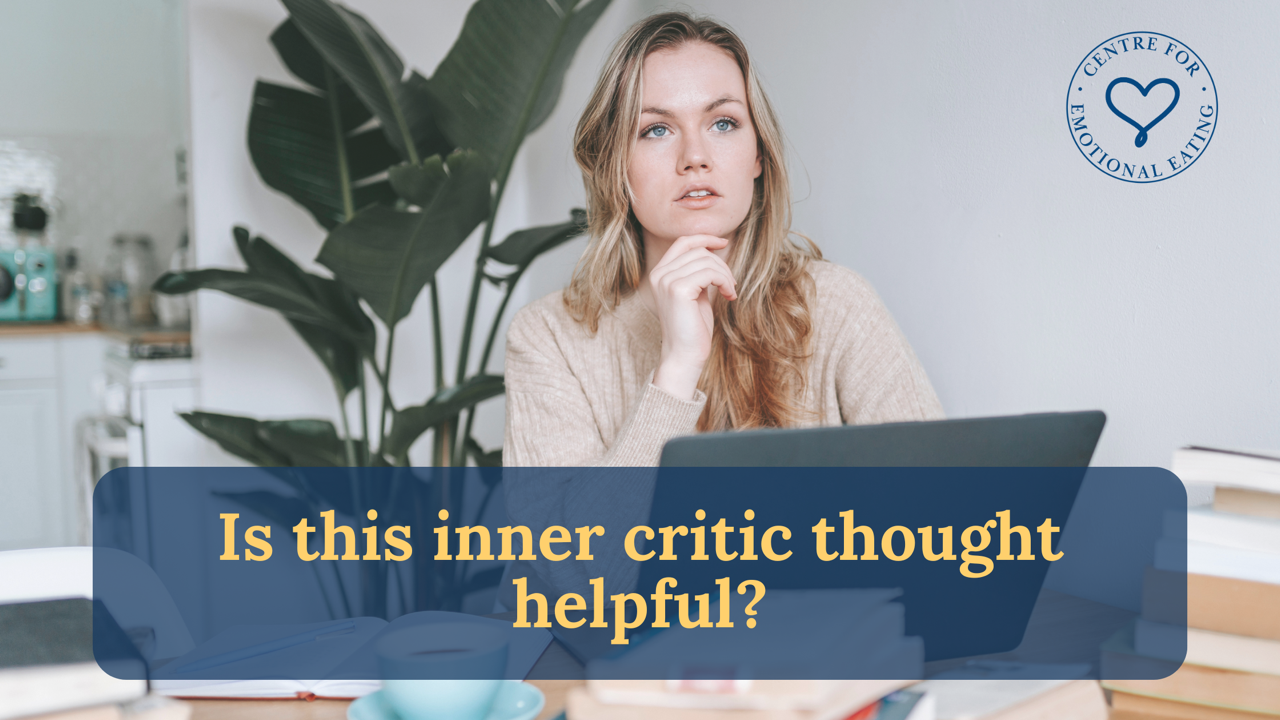
Managing your inner critic can be difficult. Its comments are cruel, judgmental, and criticize everything from your body to your intelligence to your dreams. That voice inside tears you down with comments taken from friends, family, society, and social media. Sometimes they are word-for-word and sometimes your inner critics twists them to be extra painful. We tend to internalize these negative ideas and our brain feeds them back to us as if they are true.
They aren’t.
There are a few ways to address your inner critic. I’ve talked before about how to push back against these inner comments (without falling into toxic positivity!) and today I want to give you another strategy to try out: listening to your inner critic.
Now, that doesn’t mean believing your inner critic. When thoughts like “You’re so dumb” or “No one likes you” come up, see if you can sit with them for a moment. These thoughts often jump to the surface when you’ve been triggered by a situation and your immediate action ...
Reparenting: Learning to Support the Younger You
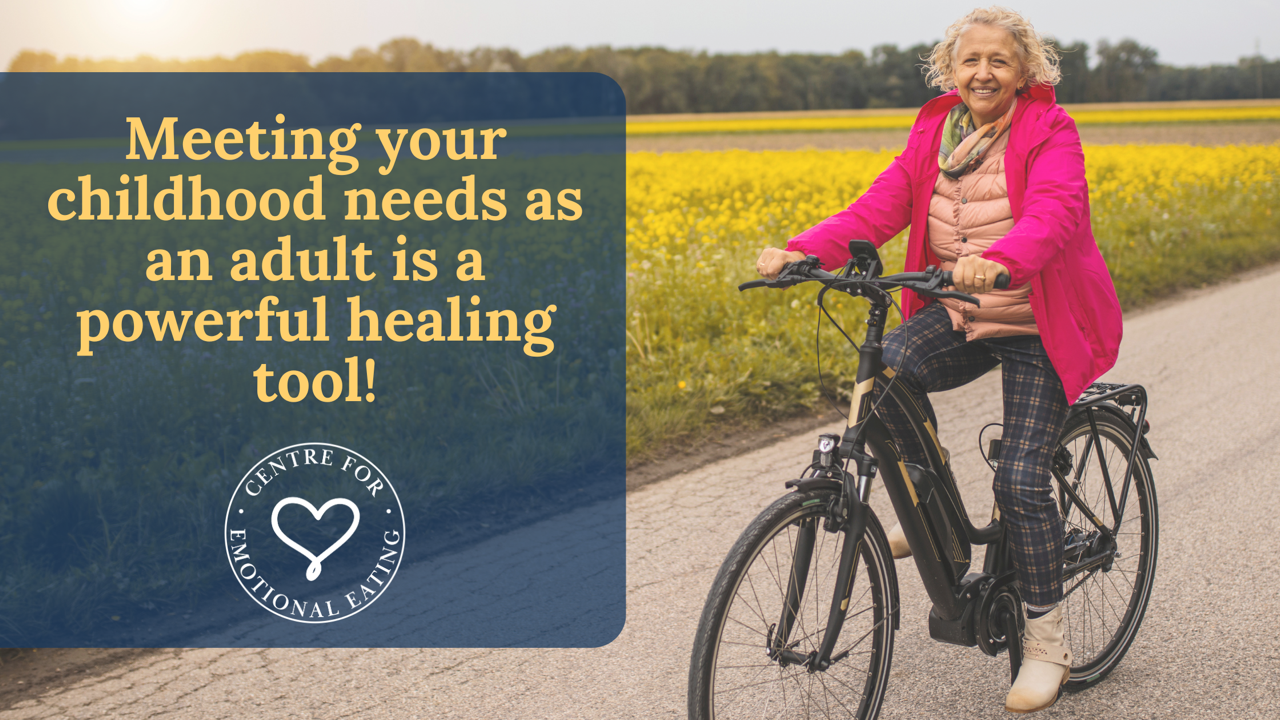
Often here at the Centre for Emotional Eating we talk about how your patterns and habits with food are influenced not by the cravings themselves, but the root cause behind what makes you act.
For many, the root cause can be found in childhood or adolescent experiences. This is because as our brains and bodies grow, we are learning and are influenced by examples displayed around us—to finish what’s on our plate, diet talk, stuffing down emotions, just to name a few. We learn from parents, caregivers, teachers, coaches, siblings, and friendship circles! But not all of these lessons will serve you as you grow into your own adulthood, some might be downright painful or destructive.
It is incredibly common to reach a point in your adult life and know things need to change but not know how. This is where therapy can be a very helpful tool in helping you sort through your thoughts and feelings, gain confidence to make your own decisions, and help you feel more resilient.
And one effective ...
Food Noise Explained: Why It Happens and How to Find Peace with It
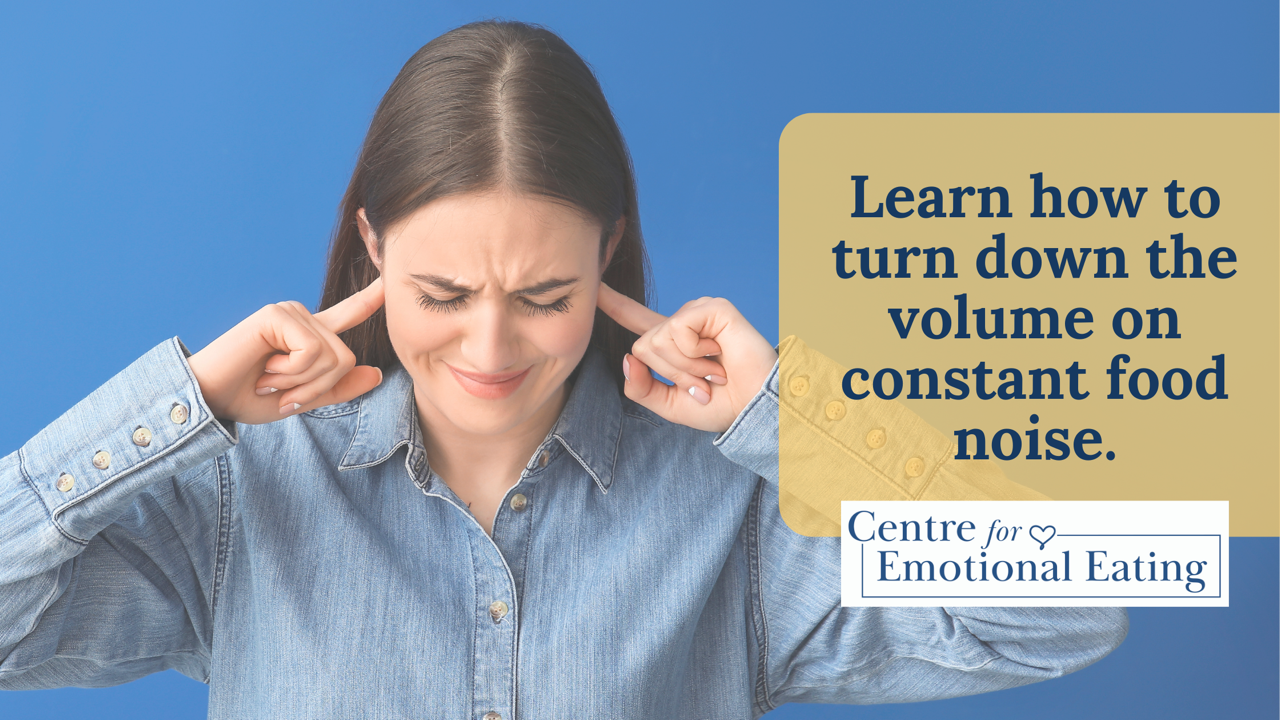
It is common to think about food: what you have to pick up at the grocery store, your weekend dinner out with friends, or even if you want a pastry to go with your coffee.
But when your mind is running a constant dialogue focused on your next meal or snack, how much and when you’ll eat, chances are you’re experiencing food noise. You might have come across this term online, so today we’re breaking down why you can’t stop thinking about food and what to do about it.
What is food noise?
We can define it as a preoccupation with food before, during, and after you eat—so all the time! This can come in the form of questions or criticisms. Do any of these sound familiar?
- “I just ate but I’m still hungry. I shouldn’t eat any more, but I kind of want more potatoes, they were so creamy, probably full of butter…”
- “I have ice cream in the freezer. I shouldn’t eat it. I want it. I’m going to eat it. That was so good, what more can I have? I’ve already had the ice cream, I’ve blown it, I’ll j ...
Retrain Your Brain: Finding Happiness Outside of Food

There are many reasons people emotionally eat: to distract themselves, to feel numb, to have something to control. But one of the common reasons I hear from clients is that food brings them a sense of happiness that they feel doesn’t compare to any other experience currently in their life. This makes emotional eating incredibly difficult to stop relying on when you don’t have others ways of accessing this feel-good emotion. Does any of this sound familiar?
- A snack feels like an only acceptable break from grinding away at work or your to do list. Your brain makes the connection that not working = food.
- You only feel your body relax once the kids are in bed and you can eat alone in the evening. The connection your brain makes here is alone time = food time.
- You only allow yourself to have foods like cake or popcorn at events like parties or at the movie theatre. Here your brain connects special events (happy times) and specific foods.Our brains love to work on auto-pilot because it ...
Summertime Depression: Seasonal Affective Disorder is a Year-Round Experience

You might have heard of, or experienced, seasonal affective disorder (also known as SAD) during the colder months of the year. Common symptoms of SAD are irritability, changes to your sleep patterns or the way you eat, and worsening of anxiety or depression. If you’re reading that and thinking “that sounds familiar” but it is the Summer and you dismiss your symptoms, we’re here to tell you that SAD can also happen during the sunnier, warmer months.
Our brains and bodies like routine: it makes things feel in control and predictable. So, any time there are changes introduced—like hotter weather, later sunsets, or change to homelife—it is understandable that our system would react in a certain way, no matter if it is Winter or Summer. There are a number of reasons why Summer SAD can happen, but here are two big ones:
Day-to-Day Disruptions
You might be planning vacations (hello travel stress!) which can add to your mental load or are having to navigate having kids home on school break....
Client Insight: “It felt scary when therapy started to change how I saw myself and others.”
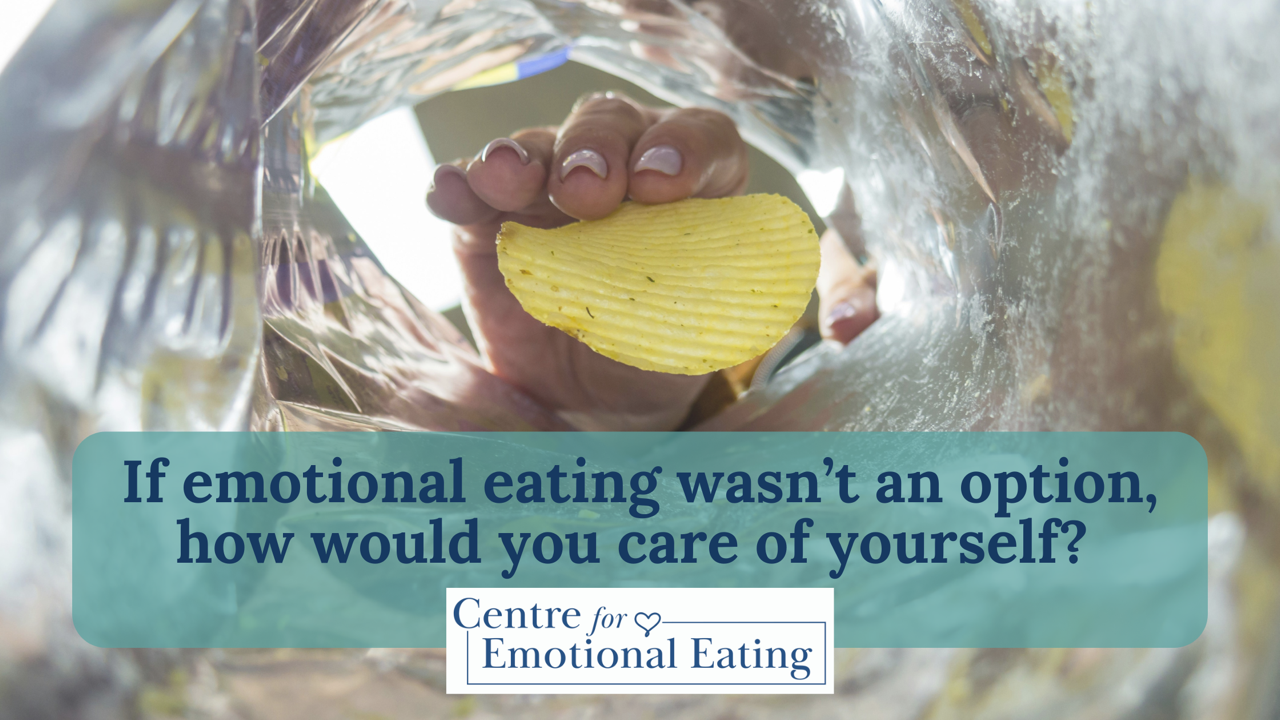
Doing the work in therapy often comes with challenging the stories you’ve always told yourself. Over time we solidify ideas about ourselves, our relationships, and the world around us. This can sound like:
“I’m broken.”
“I’ll always be an emotional eater.”
“My mom did the best she could.”
But as you face these narratives about yourself, you’ll start to find the wiggle room, the space to start re-thinking how you see yourself and what that means for your identity. This can feel destabilizing! It is scary if you always thought of yourself or those in your life one way, only to unpack that things are different that they first appeared. It can feel easier to stick with the familiar way you’ve always understood your family and friends, and even yourself.
While this experience is uncomfortable, it is also a great sign that therapy is getting to the root of your experiences. Let’s flip the script: changing how you see the world is like taking off a pair of tinted sunglasses.
Let’s try t...
How to Build Trust in Yourself
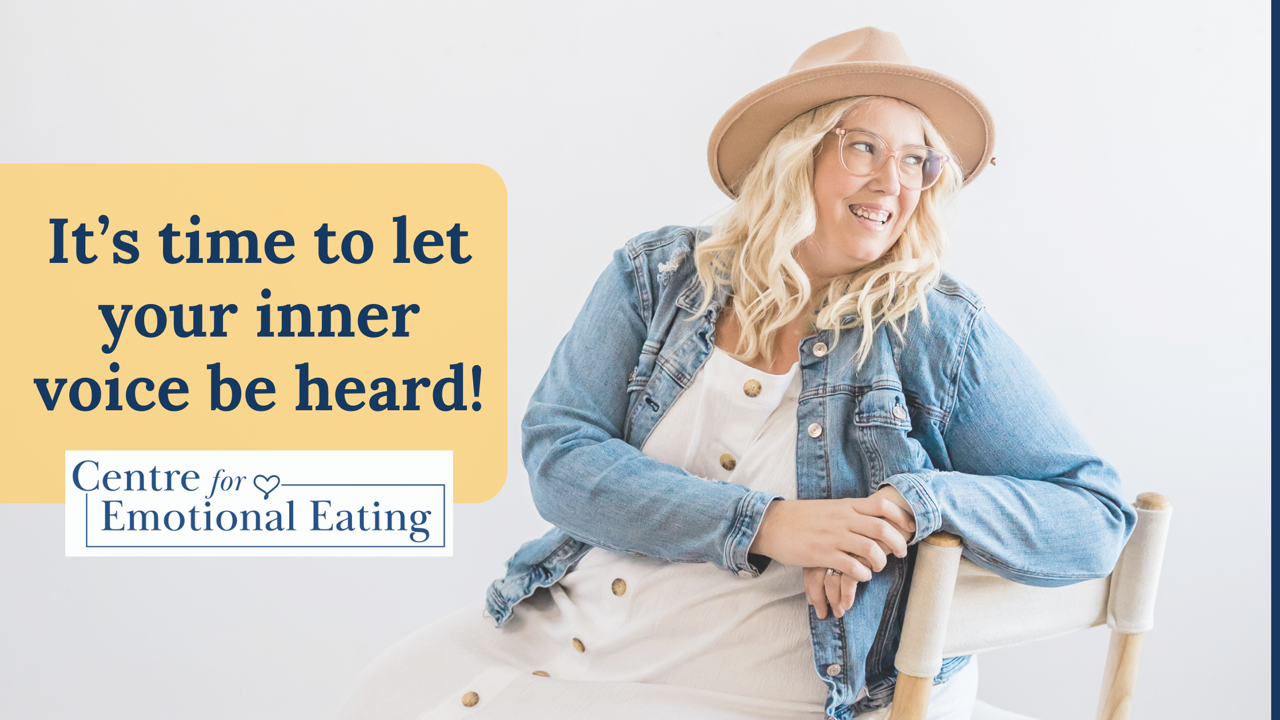
If you’re an emotional eater, you might have spent a lot of your life trying to stick to a diet or workout routine created by someone else only to keep feeling like you fail. This can grind down your sense of self-trust: you keep trying to live by the rules of others, not trusting your inner voice, and you keep feeling like you’re breaking promises to yourself by not following through.
Talk about being stuck in a loop!
It is time to start rebuilding your self-trust, an inner knowing that you are capable and have preferences. But how can you do that if you’ve been ignoring your inner voice for so long? Try thinking about how you support the people in your life who you love and then apply it to yourself. You might find that it feels easier to trust and show up for others than it is to show yourself the same level of support and compassion.
Here are a few specifics to think about:
Keep a promise to yourself. Start off with little things like setting the intention to brush your teeth b...
Why We Engage in Self-Sabotage Behaviour
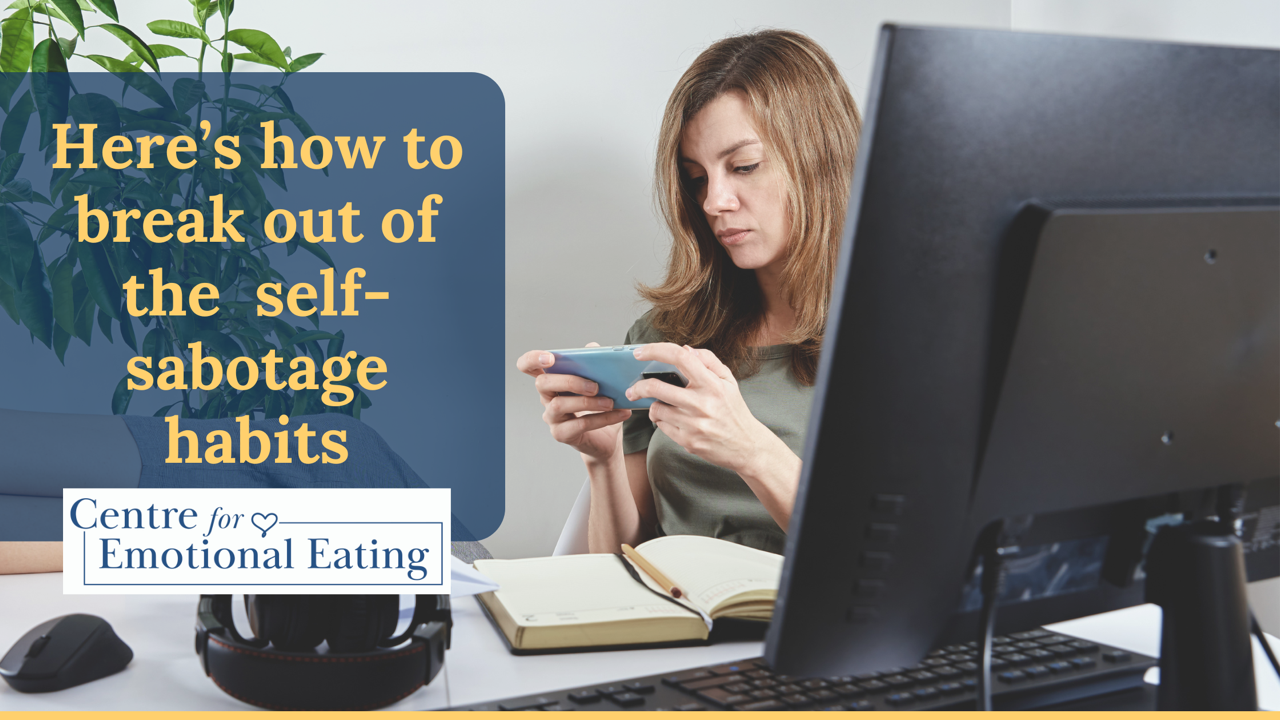
Self-sabotage is a sneaky habit that is getting in the way of, well, yourself! You might have recognized your patterns, even be aware it doesn’t make you feel good, but feel helpless to stop the action. Self-sabotage keeps you feeling stuck because there is familiarity in the outcome. Yes, it might leave you feeling shame or overfull but it feels safe.
Self-sabotage behaviour can look like:
- Perfectionism. Needing everything to be perfectly aligned and ready before taking action. But the truth is “perfect” doesn’t exist, meaning you’ll never end up taking that step forward.
- Procrastination and avoidance. It is easy to pick up our phones and scroll or focus on what foods we want to binge on as a way to numb out rather than face something.
- Constant self-doubt and criticism. This can be feeling like you never measure up or that you can’t possibly meet your goals, so why even try.
These patterns of self-sabotage show up not just around a fear of failure, it can also come up as a fe...
How to Deal with an Endless To Do List

Checklists can be a helpful tool: they can organize your day and make you feel motivated. But when it feels like you’ve got a never ending to do list, you can feel defeated and constantly drained.
You might even find yourself unable to relax or feel like you haven’t ‘earned’ rest because of all the lingering things you need to get done. With this mentality it is easy to fall into emotional eating patterns to avoid your to do list.
Food becomes the only ‘acceptable’ way to take a break, so you go grab an afternoon pastry to get away from your desk or find yourself in the pantry looking for a snack to focus on something other than your tasks. This pattern of eating also packs a one-two punch of helping you disassociate from your to do list and all the feelings around it: stress, overwhelm, anxiety, fear.
It is unavoidable that life will get busy, but that doesn’t mean you have to live in a constant state of stress eating. Here are four key strategies to bring you some peace of mind, ...


